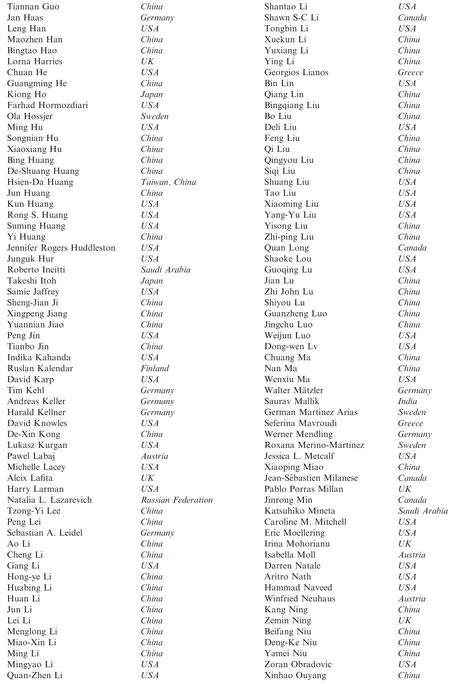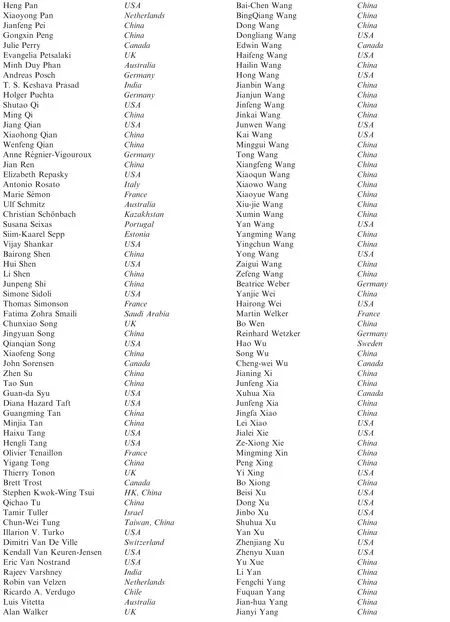Acknowledgments to Reviewers 2018
2019-05-14
The editorial team of GPB wishes to extend heartfelt thanks to the reviewers who have provided valuable comments for manuscripts under consideration by GPB during 2018.We highly appreciate your great contributions,which are vital for the ever-improving scientif ic quality of the journal.We are expecting more submissions and more stringent review processaccordingly.Pleasebeawareof therising bar of quality for theacceptablearticlesand look forward to your continued support in the years to come!




Call for Papers
Special Issue on‘‘Single-cell Omics Analysis’’
We are very pleased to announce a special issue,to be published in the spring of 2020,on‘‘Single-cell Omics Analysis''in the journal Genomics,Proteomics&Bioinformatics(GPB).
The cell has been primarily studied as a part of its bulk population for decades until recent breakthroughs in single-cell omics technologies.The study of the seemingly isogenic cellular populations often buries diverse cellular characteristics.Even in cells with the same cellular history,heterogeneity inherently arises due to the stochastic fluctuation of gene expression during transcription and translation or noises in signaling pathways.These hidden cell-to-cell variations can be paramount in the diagnosis and treatment of disease.For instance,the heterogeneity in tumor cells is crucial in understanding tumor initiation,progression,metastasis,and therapeutic response.A very small subpopulation of cells that may confer the most resistance in a preclinical drug test could be responsible for tumor relapse in patients after treatment.Thus,as medicine becomes more and more personalized,there is a greater desire to more accurately represent and understand single cells and the distinct subpopulations.
The newly developed technologies for profiling cellular heterogeneity have spurred a worldwidepursuit of single-cell study in thefield of omicsstudies,investigating thegenome,epigenome,transcriptome,proteome,metabolome,and their inherent interactions.This knowledge facilitates a deeper understanding of how underlying molecular and architectural changesalter cell behavior,development,and disease processes.Genome-scale amplification of genomic DNAs or mRNAs transcribed in single cells allowed for the measurement of genetic alterations and cell types at an unprecedented level.The emerging microchip-based tools for single-cell omics analysis further enable the evaluation of cellular omics with high throughput,improved sensitivity,and reduced cost.On the other hand,single-cell high-dimensional data obtained with high-throughput technologiesalso posenew challengesin bioinformaticsto analyze,process,and makesenseof the big data in order to deliver new biological insights and knowledge.
This special issue aims to highlight the latest advances in single-cell technologies and informaticstoolsfor analytics genomics,epigenomics,transcriptomics,proteomics,metabolomics and multi-omics at thesingle-cell resolution.It will also showcasethe utility in basic research and preclinical or clinical applications to serve as a forum to exchange prospects on challenges and future opportunities that will facilitate the improvement and broad adoption of single-cell omics in biology and medicine.
To promote the understanding and the comprehensive use of single-cell omics analysis,we dedicate this special issue to the current advances of single-cell omics analysis and beyond.Dr.Luonan Chen from Shanghai Institutesfor Biological Sciences,Chinese Academy of Sciences,Dr.Rong Fan from Yale University,and Dr.Fuchou Tang from Peking University are the guest editors for this special issue.
This special issue covers(but not be limited to)the following topics:
➢ Single-cell whole-genome amplification and sequencing.
➢ Single-cell epigenomics(e.g.,DNA methylation and chromatin accessibility)➢ Single-cell full length mRNA sequencing
➢ Massively parallel single-cell gene expression profiling
➢ Single-cell microRNA and small RNA sequencing
➢ Single-cell protein expression profiling to study phenotype and signaling pathway➢ Single-cell protein secretion profiling and immune function analysis
➢ Single-cell metabolomics and multiplex metabolite measurement
➢ Single-cell morphometric analysis,cell migration,and physical properties
➢ Single-cell multi-omics and integrative analysis
➢ Single-cell dimensional data analysis and modeling
➢ Single-cell network inference and analysis
➢ Pseudo-time trajectory analysis
➢ New technologies for trapping,manipulation,and retrieval of single cells
➢ Correlating genotype to phenotype and function.
➢ Mapping embryogenesis,development,and stem cell differentiation.
➢ Human cell atlas and discovery of new cell types
➢ Tumor cell atlas and tumor microenvironment
➢ Clonal evolution and therapeutic resistance
➢ Immunotherapy and immune monitoring
Original studies,reviews,methods,databases,webservers,application notes,etc.are all welcome.The deadline of submissions to this special issue is June 30,2019.Manuscripts should be
prepared according to the Guide for Authors of the journal website and submitted online at http://ees.elsevier.com/gpb/,choosing the article type‘‘SI:Single-cell Omics''.Please indicate in the cover letter that your submission is for Single-cell Omics Analysis special issue.
For further information,please contact us:
Dr.Luonan Chen(lnchen@sibs.ac.cn);
Dr.Rong Fan(rong.fan@yale.edu);
Dr.Fuchou Tang(tangfuchou@pku.edu.cn);
Editorial Office(editor@big.ac.cn).
杂志排行
Genomics,Proteomics & Bioinformatics的其它文章
- GPA:A Microbial Genetic Polymorphisms Assignments Tool in Metagenomic Analysis by Bayesian Estimation
- How Microbes Shape Their Communities A Microbial Community Model Based on Functional Genes
- Agricultural Risk Factors Inf luence Microbial Ecology in Honghu Lake
- Inulin Can Alleviate Metabolism Disorders in ob/ob Miceby Partially Restoring Leptinrelated Pathways Mediated by Gut Microbiota
- Eあects of Proton Pump Inhibitors on the Gastrointestinal Microbiota in Gastroesophageal Ref lux Disease
- Antibiotic Treatment Drives the Diversif ication of the Human Gut Resistome
